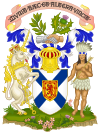Politics of Nova Scotia | |
|---|---|
 | |
| Polity type | Province within a federal parliamentary constitutional monarchy |
| Constitution | Constitution of Canada |
| Legislative branch | |
| Name | General Assembly |
| Type | Unicameral |
| Meeting place | Province House, Halifax |
| Presiding officer | Speaker of the House of Assembly |
| Executive branch | |
| Head of state | |
| Currently | King Charles III represented by Arthur LeBlanc, Lieutenant Governor |
| Head of government | |
| Currently | Premier Tim Houston |
| Appointer | Lieutenant Governor |
| Cabinet | |
| Name | Executive Council |
| Leader | Premier (as President of the Executive Council) |
| Appointer | Lieutenant Governor |
| Headquarters | Halifax |
| Judicial branch | |
| Court of Appeal | |
| Chief judge | Michael Wood |
| Seat | Law Courts, Halifax |
The politics of Nova Scotia take place within the framework of a Westminster-style parliamentary constitutional monarchy. As Canada's head of state and monarch, Charles III is the sovereign of the province in his capacity as King in Right of Nova Scotia; his duties in Nova Scotia are carried out by the Lieutenant Governor, Arthur LeBlanc. The General Assembly is the legislature, consisting of the Lieutenant Governor and fifty-five members representing their electoral districts in the House of Assembly.[1] The Government is headed by the Premier, Tim Houston, who took office on August 31, 2021. The capital city is Halifax, home to the Lieutenant Governor, the House of Assembly, and the Government. The House of Assembly has met in Halifax at Province House since 1819.[2]
- ^ "About the Legislature". Nova Scotia Legislature. 2016-09-06. Retrieved 2018-07-15.
- ^ Province of Nova Scotia (2009). "Province House, Halifax, Nova Scotia" (PDF). Nova Scotia Legislature.